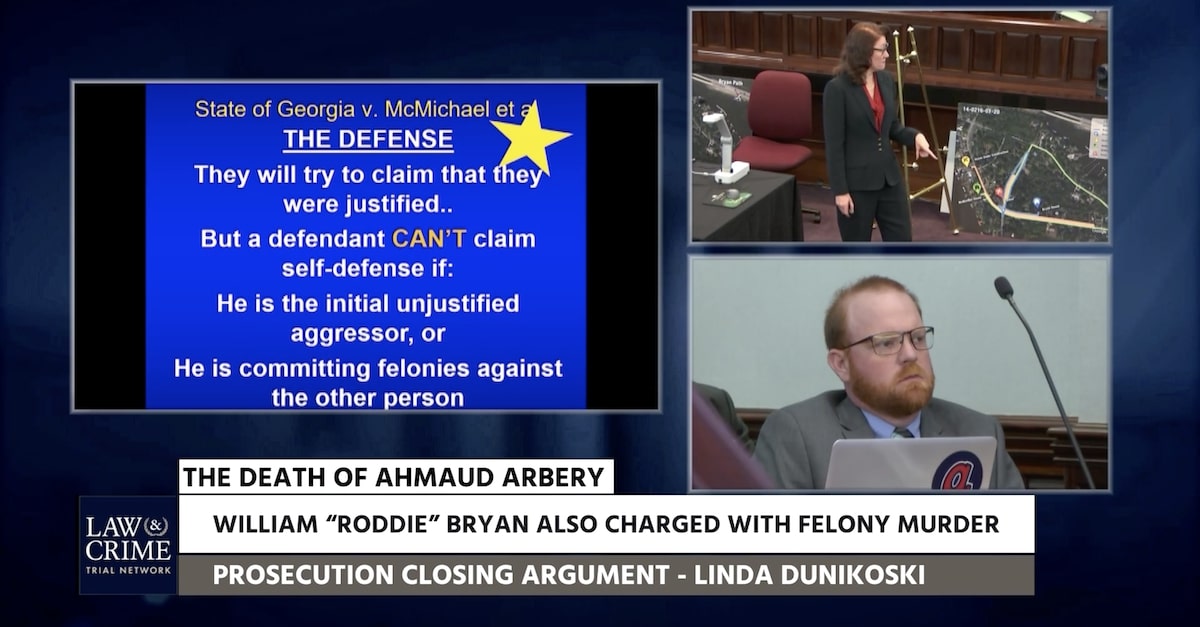
Linda Dunikoski, the lead prosecutor against Ahmaud Arbery’s accused murderers, displays a slide on the use of deadly force during summations.
From opening statements to closing summations, the trial of Ahmaud Arbery’s now-convicted murderers seemed to focus on everything but race, the dimension of the case that catalyzed global outrage and protests.
Breaking her silence on that strategy, the case’s lead prosecutor Linda Dunikoski explained on the podcast “Stay Tuned: with Preet Bharara” that she did not want to alienate the nearly all-white jury in Georgia.
“People have implicit bias,” Dunikoski told fellow prosecutor Bharara, who previously served as U.S. Attorney in the Southern District of New York. “They just do. And some people are aware of it, and some people aren’t. And some people, when called out on it, get defensive and go into denial. Because nobody thinks that they’re a racist and nobody thinks that they’re biased. And the minute you start attacking people, you get their back up, you get them in a defensive posture.”
The jury that convicted Arbery’s killers—gunman Travis McMichael, his father Greg McMichael, and William “Roddie” Bryan, who filmed the shooting—was composed of nine white women, two white men, and one Black man.
Before trial, Judge Timothy Walmsley found “there appears to be intentional discrimination” in the defense’s use of peremptory strikes, but he added that precedent tied to his hands to address it.
Walmsley ultimately dealt life sentences to all three men, precluding the possibility of parole for the McMichaels.
Dunikoski told Bharara that invoking the Confederate insignia on the license plate on the gunman’s pickup truck could have backfired.
“The worst fear was, and I’ll just give this as an example, pointing out repeatedly that Travis McMichael had the stars and bars, which is the old flag from Georgia, on the front of his truck. Pointing that out to the jurors may have backfired on us, especially if we have a female juror whose favorite nephew also has that in the front of his truck,” she said.
During the interview, Dunikoski described deliberating with her boss—District Attorney Flynn Broady, who is Black—about how to approach the subject of race, and both found it unnecessary to land convictions.
“What I did when we brainstormed about this, I went to my boss and I said: Listen, if everybody was green and everybody was from the same socioeconomic strata and class, then it’s still illegal what they did,” she recounted on the show. “And there is no justification, there is no excuse under the law, for what they did. So it doesn’t matter.”
According to Dunikoski, Broady replied: “I don’t want to make this us-against-them. I don’t want to make this a white-versus-Black thing. What they did was illegal. Go show the jury what they did was illegal.”
Now that the state’s criminal trial is over, race likely will come into sharper focus in ongoing civil and criminal litigation. Arbery’s mother Wanda Cooper-Jones continues to pursue a federal civil lawsuit, filed on the one-year anniversary of Arbery’s death, which accused Glynn County law enforcement of covering up her son’s murder. The lawsuit claimed that Travis McMichael used a racial slur after shooting Arbery to death.
Federal prosecutors also separately charged the men for violating Arbery’s rights, allegedly “because of Arbery’s race and color.”
Listen to the podcast, below:
(Screenshot of Dunikoski from Law&Crime’s coverage of the trial)